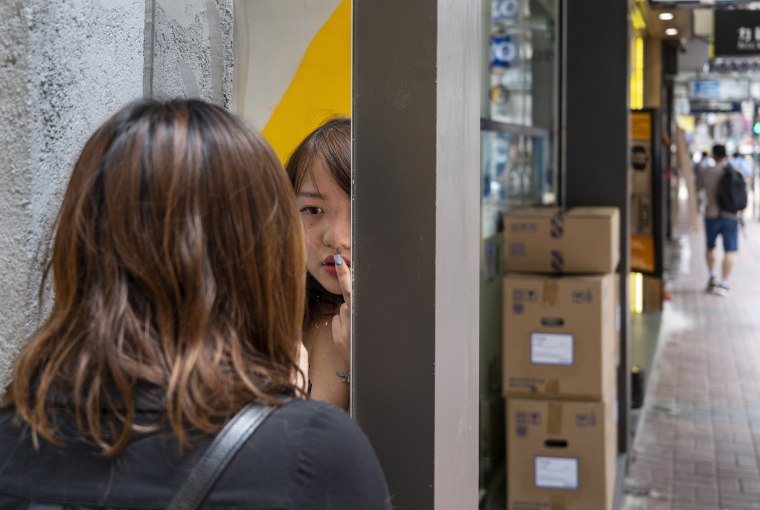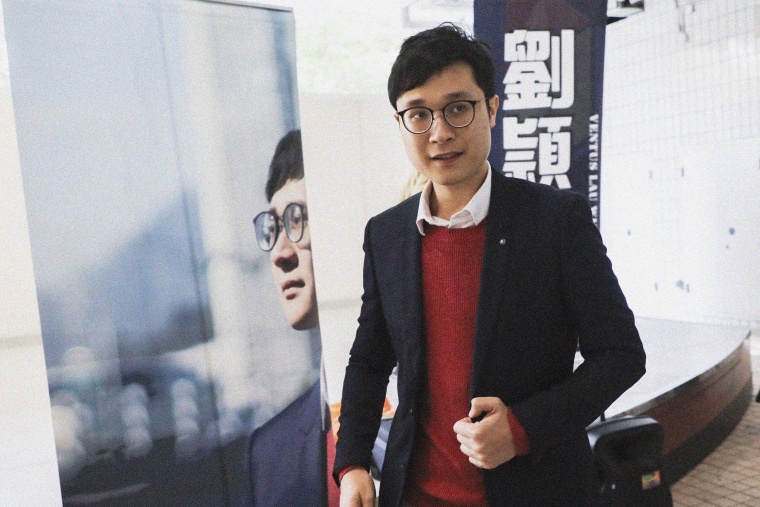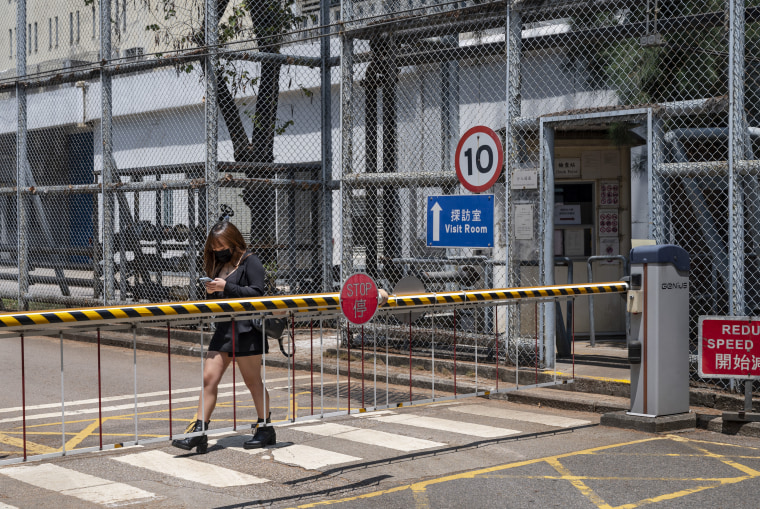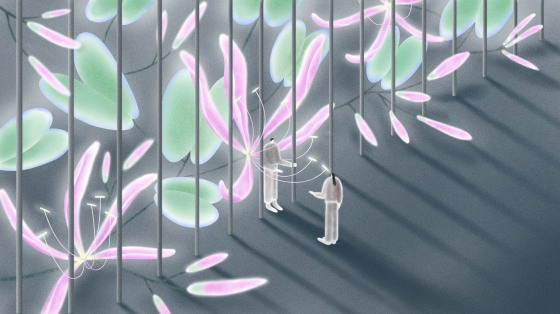NBC News is not naming the author of this piece to protect their security and that of their family.
HONG KONG — Ventus Lau and Emilia Wong see each other for 15 minutes at a time.
That’s the longest a visit can last at the prison in Hong Kong where Wong goes every day to see Lau, her partner of seven years, the couple separated by metal bars and sandwiched between two pieces of plexiglass.
It is 23 hours and 45 minutes before they can see each other again.
They could be apart for a lifetime if the courts rule against Lau, who along with 46 other pro-democracy politicians and activists has been charged in the biggest single case under the Chinese territory’s national security law. Critics say the law, which Beijing imposed in 2020, is a direct assault on long-cherished freedoms in the former British colony, which on Friday will mark 25 years since its return to Chinese rule.
“My future is entirely in the hands of the authorities — I am a fish in a tank,” Lau, 28, wrote in a letter to NBC News last year. “It’s possible that I cannot taste freedom again in my life.”

Officials argue the national security law, or NSL, was necessary to restore order in the city after sometimes violent anti-government protests in 2019. But critics say it has been instrumental in silencing Hong Kong’s pro-democracy movement, with most of its most prominent figures jailed, resigned from politics or living in self-exile abroad.
Lau and his co-defendants, known as the “Hong Kong 47,” are still awaiting trial more than 15 months after being charged with conspiracy to commit subversion, one of four crimes the national security law made punishable by life in prison, along with secession, terrorism and collusion with foreign forces.
In a break with longstanding practice in Hong Kong courts, all but 13 are being held without bail, including Lau.
Extended pretrial detention has become “a huge and growing problem under the NSL,” said Tom Kellogg, executive director of the Georgetown Center for Asian Law.
“Dozens of NSL defendants are being held, even though most of them are accused of nonviolent offenses and really should be allowed to be at liberty as they prepare for trial,” he said.
Kellogg said this new trend, driven by the national security law, is “fundamentally reshaping” Hong Kong’s criminal justice system.
“This is a very serious concern and a violation of the right to be presumed innocent,” he said. “It also touches directly on an individual’s right to a fair trial.”
Hong Kong officials say refusing bail is justified for national security offenses and deny that delays in court proceedings are politically motivated, with the Justice Department saying it has “taken every possible measure” to expedite the prosecution process.
“All applications are handled in accordance with established procedures and due process is fully covered,” Secretary for Justice Teresa Cheng said in a statement in April. “If a defendant, upon legal advice or otherwise, decides to make every possible procedural application irrespective of merits, he or she cannot at the same time conjure any complaint about delay.”
Activism with impact
Lau, who says his activism stems from a strong sense of Hong Kong’s distinct identity, is part of the “localist” movement, which advocates the preservation of Cantonese culture and the semi-autonomy that Hong Kong was promised for 50 years when it returned to Chinese sovereignty. He ran for the local legislature in 2018 but was disqualified by election officials who cited social media posts expressing support for Hong Kong independence.

Wong, 27, said that moment convinced her that Lau’s activism was having an impact.
“If your work attracts no hatred and opposition, it’s not making an influence. That’s what he told me,” she said.
Lau was a prominent figure in the protests that roiled the city for months in 2019 before being stalled by the pandemic and then the national security law, which took effect on June 30, 2020. The first arrest under the new law came the next day, amid protests on the anniversary of the Hong Kong handover.
Since then there have been almost 200 national security arrests. By far the biggest roundup was on Jan. 6, 2021, when police arrested more than 50 pro-democracy figures in a single morning, including Lau, Benny Tai and Joshua Wong.
Forty-seven of them were later charged over their roles in an unofficial primary election held in July 2020. More than 600,000 voters selected pro-democracy candidates to run for the legislature, where they hoped to gain a majority. Authorities accused election organizers of planning to force Chief Executive Carrie Lam’s resignation by blocking the government budget, a maneuver that experts say is legal under Hong Kong’s mini-constitution.
During marathon bail hearings held over four days in March 2021, several of the defendants — who range in age from their 20s to their 60s — were hospitalized with exhaustion. As in other national security cases, judges have been reluctant to grant bail, often arguing there is no guarantee that defendants won’t violate the security law again.

In at least one ruling denying bail, the judge cited comments the defendant had made in interviews and even private messages with reporters from international media. Other defendants were denied bail over social media posts or the use of crowdfunding sites.
The trial has been delayed multiple times as prosecutors seek to move it to a higher court that can impose longer sentences, leading even a national security judge to express concern. In an April ruling, Judge Esther Toh said courts should be proactive in “insisting on milestone dates and deadlines,” citing the large number of defendants in the case.
That same ruling revealed that at least 11 unnamed defendants intend to plead guilty. Experts say those defendants, seeing acquittal as unlikely, may be hoping they can at least reduce their sentences. But long pretrial detention, they say, may have also worn them down.
‘Like two cats’
Lau and Wong, who met at a debating contest as students at the Chinese University of Hong Kong, have engaged in spirited discussions ever since, friends say, on everything from local politics to women’s rights.
“They are like two cats — in one moment they are vividly arguing on certain topics, but in the next, they are hugging and kissing again,” said William Shek, Lau’s friend, who knows them both.
Even after Lau went to prison, the two continued their debates through written letters.
“Not everyone can understand my weirdness, but you accept it completely,” Lau wrote to Wong last year.
He also told Wong that if they hadn’t experienced Hong Kong’s political turmoil together, they might not have established such a deep bond.
“If the world was not as cruel as it is now, we might not have realized how important values and ideals are to a relationship,” he wrote. “If we hadn’t felt like the end of the world was approaching any minute, I wouldn’t have cherished every minute we spent together.”
Wong, who graduated with a law degree but now dedicates her time to being a feminist online influencer, said Lau has been a source of support for others while in prison.

“He started reading the Bible more often, and has become more spiritual than before,” she said. “When infuriating news broke out, he was the one who offered comfort to friends and family.”
In addition to visiting Lau and trying to attend to his needs, Wong has become his representative to the media and been granted full authority over his finances.
She described it as living the lives of two people at the same time and said the stress had taken a toll on her health. But she said she has been feeling more positive since adopting a more active lifestyle that involves hiking and other exercise.
“I used to be overwhelmed by handling Ventus’s affairs, so I didn’t spend time on taking care of myself,” she said in an interview last week.
Both Lau and Wong say they avoid thinking about their future together, not knowing what it may hold.
In detention, Lau said, he had a dream that stuck with him.
“I was holding Emilia’s hand, running through underground tunnels, fleeing something,” he wrote in his letter to NBC News. “We finally found an exit, but that only led us to the courthouse.”
